- Home
- A. J. Hartley
Chains
Chains Read online
Begin Reading
Table of Contents
About the Author
Copyright Page
Thank you for buying this
Tom Doherty Associates ebook.
To receive special offers, bonus content,
and info on new releases and other great reads,
sign up for our newsletters.
Or visit us online at
us.macmillan.com/newslettersignup
For email updates on the author, click here.
The author and publisher have provided this e-book to you without Digital Rights Management software (DRM) applied so that you can enjoy reading it on your personal devices. This e-book is for your personal use only. You may not print or post this e-book, or make this e-book publicly available in any way. You may not copy, reproduce, or upload this e-book, other than to read it on one of your personal devices.
Copyright infringement is against the law. If you believe the copy of this e-book you are reading infringes on the author’s copyright, please notify the publisher at: us.macmillanusa.com/piracy.
It was a long way down to the turbid waters of the river Kalihm.
I buckled myself into my harness and hooked its lanyard to the cable which ran alongside the great chain links. The chains formed a long, slow swag several hundred yards long between the towers of what will be—if it ever gets finished—Bar-Selehm’s first suspension bridge. The saddles on the tower tops where I was working featured a series of great pulley wheels which allowed the massive chains a little movement, and while that would mostly stop once the carriageway was hung, without it—and in this foul weather—the chains were constantly straining and relaxing so that the entire skeletal frame of the bridge groaned unnervingly. Occasionally, an entire link would shift over the pulley and the chain would suddenly drop a couple of feet all along its length. If you were caught under it, the weight might tear you out of your harness and send you hurtling down, so you got used to listening for the humming creak of the iron vibrating from link to link.
Though I had not admitted it even to Tanish, my eleven-year-old apprentice, I was afraid of the river, and not just because of the creatures that lived in it. Though I had grown up close to water, I had learned early to be wary of it, and I had never learned to swim.
Not that I’d get the chance here. A fall from the tower tops would be as good as hitting cobbles, so I’d be dead before the crocs got to me which was, I supposed, a kind of blessing. I knew that because I’d seen it only a week before. One of the boys from the Sidings gang—a shy, nervous kid who I had shown how to clean the paint from his brushes so he wouldn’t get shouted at by the foreman—had lost his footing in the last hour of the shift. He fell right past me and vanished noiselessly under the surging brown water. I thought I saw him resurface downstream, but he was quite still. If the crocodiles didn’t take him he was probably carried all the way into the bay and out to sea.
I never knew his name, and after the day of the accident, I didn’t hear anybody talk about it. It was, they assumed, just how things were. That they were probably right left a cold hollow in my gut.
I took hold of the guide cable in one gloved hand and drew myself along, inching out away from the tower. We had already worked the metal with scrapers and steel wool, so the surface was coated by a fine orange powder that smelled uncannily of blood. About sixty feet out, and about the same height above the temporary catwalk, I wiped away the surface rust, dipped my brush, and began to daub the bare metal with the oily paint. Black as tar and almost as thick, it dripped on everything. By the end of my first day on the job my brown arms and face, my clothes and hair had all been hard and sticky with the stuff no matter how much I washed at the pipe on the dockside. The next morning I went down to the river itself to bathe, but it was moving too fast and I couldn’t see if there were crocodiles lurking near the bank, so I gave up. Instead, and though I knew the boys would mock me, I cut my hair short with a mortar knife, returning to my tent conscious of the way the black Mahweni laborers watched me, their faces curious at what the Lani girl was doing, as if I was a strange and solitary bird, rarely seen in the city.
In a sense they were right, but I was, in fact, quite comfortable in the city—far more than I would have been out in the weancat-haunted wilds of the bush—and was just as comfortable in my strangeness and solitude. It was only being on the ground among people that unsettled me. The only benefit of working on this bridge was seeing firsthand all the details that went into its construction. The newspapers had been breathlessly telling the world that the bridge would be “the architectural jewel of Bar-Selehm.” Who wouldn’t be caught up in the excitement? The answer, apparently, was all the boys in the gang. Though I was still three months shy of my seventeenth birthday, I had been a steeplejack for more than five years and had learned a good deal about architecture and construction. Apart from Tanish, who treated everything I said as profound, my crewmates found my curiosity about such things comical. Another indicator, if any were needed, that I did not belong among them.
To me, each stage of the bridge was a step toward a glittering new order. But after the great caissons had been opened up in the riverbed and the main pilings had been erected three years ago, the work had slowed to a trickle. Now the two main towers were in place—though they had yet to receive their stone cladding—and the great chains from which the bridge itself would hang had been rigged and stretched to their desired tension, dragged into place by great steam-driven engines built into the anchorages at each end. Great mechanical cranes, floated in on barges and moored in place, loomed over the river like vast, ponderous herons, dipping and rising, rising and dipping. At that moment, where the bridge would be, only a rickety catwalk of planks and cables connected the towers, dangling precariously from the great chains overhead. It was hard to believe that the thing would ever be the primary railway route between the city to the northwest and the docks to the southeast.
Right now the problem was the chains. The original architect had wanted steel cable, but Malden and Company—headed by Sir William Defarge—had decided that massive chain links would bear more weight and were cheaper to produce.
They also rusted.
As the project dragged on, the incomplete bridge—standing skeletal and forlorn a mile from where the Kalihm met the sea, a monument to various kinds of mismanagement and yet to bear so much as a single wagon of coal—was starting to fall apart. With each passing week the great chains corroded and flaked till it seemed impossible that the great towers would ever be more than the perches for fish eagles.
That was where I came in. Not just me, of course, but Tanish and the whole Seventh Street gang as well as the Sidings boys and the East Spires crew. Half of the steeplejacks in the city had been conscripted to sand and paint every colossal link before lasting damage was done.
To me it was more than a wage. I was proud to be a part of so noble a project, which was perhaps why I got on with my painting with a dedication unknown among my workmates. When I felt the wind pick up I doubled my efforts, determined to finish my section of the chain, because that was my job, and I always did my job. Every day I was the first in position and the last to leave when the rain got too heavy. There were days when I painted twice as much as some of the boys. Morlak, our gang leader who usually presided over my work on the chimneys and tall buildings of the city, always claimed not to notice the speed and quality of my efforts, but this was not Morlak’s project. He had merely hired me and the rest of the gang out, and other people were watching. Closely, as it turned out.
I clambered down to refill my can. I was paint streaked, my arms and shoulders trembling from the exertion of the work. In my exhaustion, I almost collided with the white foreman standing beside a man in a heavy coat whose face was sha
ded by a massive black umbrella. Under the foreman’s appraising gaze, I felt myself shrinking, muscles tightening in case he was going to strike me. The umbrella shuddered, collapsed, and folded. Sir William Defarge emerged from under it, scowling at the raindrops which spattered his highly polished shoes.
A tide of panic flowed through me. He was a big man in his sixties with a pouchy pink face and side whiskers so wild and full that they were almost a mane.
“You are Anglet Sutonga,” said the foreman, a blunt, hard-faced man. I had never heard him speak below a shout before. He made my name sound like an accusation, and there was a contemptuous curl to his lip as he gazed down upon his notebook.
“Yes, sir,” I said.
“From Seventh Street?”
“Yes, sir,” I responded, my unease driving the next words out of me. “Is there a problem with my work?”
“Seventh Street is Mr. Morlak’s gang, is it not?”
This was Sir William.
Unable to say more, I just nodded, eyes lowered.
“There’s no need to be afraid, child,” said Sir William.
He spoke so gently, with such apparent warmth and kindness, that I looked up in astonishment to find him smiling at me.
“Morlak,” he mused, glancing at the bull-headed foreman. “What do you think?”
The foreman leaned over the catwalk and spat expressively into the river. “He’ll try to chisel you,” he said. “Especially if he thinks she’s worth keeping.”
He sounded doubtful that anyone might, and Sir William read the confusion in my face.
“Do you always work as hard as you have done here?” he asked. “I see you up there scampering about like a red-tailed civet: quite fearless! And you never miss a bit, do you? Mr. Harkson here has to send your fellows back up time after time to repaint the parts they miss as soon as the chain turns, but not you, eh, Miss Sutonga? Never you.”
“I try to give satisfaction, sir,” I said.
“I see that indeed,” he answered, opening his umbrella as the rain intensified and using it to shade us both. He stepped so close I almost touched his great round belly. Harkson scowled at being left out in the weather and spat again.
“How would you feel about coming to work for me?” said Sir William.
Again, I looked up into his pink, bewhiskered face with the kind of confusion that was almost alarm.
“I thought that I was,” I said.
“Subcontracted to me through Mr. Morlak, yes,” said Sir William, starting to walk the creaking catwalk toward the city side so that I was obliged to move with him. “But I have workers of my own who are paid as individuals, men and women who receive a weekly wage in their own right. They work regular hours. They get sick time, even holidays. They can live where they like, but they have first refusal of the rather excellent houses my own company has built beside the Dock Street fish market. Perhaps you know them?”
I stared at him.
Yes, I knew them. They were real brick houses with painted wooden trim and slate roofs and little squares of garden by the front doors where flowering bushes grew. They had fireplaces, and running water, and the streets outside were plumbed for gaslight. More pointedly, they were not the squalid tents of the riverside camp or the derelict weavers’ shed on Seventh Street where I normally lived with the gang.
I generally tried not to speculate on impossible things. My hopes for the future rarely went beyond food for my belly, my own fierce privacy, and a roof over my head. Longer term health, wealth, and happiness were the stuff of novels and of my most secret of fantasies. In those idle dreams I might have allowed myself to imagine a day when, as a result of skill earned from exacting repetition day after long, dangerous day, I came to live in one of those neat brick houses …
Sir William waited for my answer. I only nodded.
He seemed pleased by this. “Well then, follow me.”
The steady drumming of the rain on the umbrella was hypnotic. As we walked, I risked a glance up at him and found him gazing at the work site which had, by this time, become a little town in its own right. Tents, shelters, cabins, and sheds had sprouted along the south bank of the river at the other end of the bridge, the whole impromptu settlement thick with noise and smoke and a steady, sour stink at all hours. The work crew had to be fed and clothed, their tools maintained, their boots and aprons mended. Every morning new pieces of equipment were rolled into place, and every night the place flared with drunken squabbling and the occasional bellow that you had to consider for a moment to figure out if you’d caught the end of a joke, or the end of a life. The dragoons kept to the edges of the camp, their rifles loaded and bayonetted, but it was clear that they were there to keep us from straying and didn’t much care what happened inside.
The camp was segregated, of course: the Mahweni were on what had been waste ground on the dock side, sleeping in prefabricated sheds they had raised themselves in the first days of the job, while the whites—the smallest group—had spacious, individual cabins on the opposite bank, closer—as it were—to civilization. The Lani camp (which would, at this time of day, be growing fragrant with the nostril-tingling aromas of curried dahl cooking on a makeshift stove) was under the southernmost bridge tower, squeezed in between the river and the higher, drier ground claimed by the Mahweni. The Lani kept to themselves. The blacks kept to themselves. The white men—the site foremen, the architects, and the bankers—watched over us, gave us our daily orders, paid us our wages, and drank tea out of the rain. And here I was, walking with the most important of all of them …
The sound of hammers on steel rang out and I was startled from my thoughts to see we had come all the way to the city-side tower. A dozen shirtless black men were pounding rivets while others used a great steam-driven device to drill the holes for retainer screws tall as a man and fashioned from wrought iron.
“This way, Miss Sutonga,” said Sir William, showing me into one of the only truly completed parts of the bridge: a stone turret connected to one of the suspension chain anchors. It was a fortified structure designed to hold several soldiers, and its windows were wedge-shaped notches into the thick masonry through which they could shoot. Conflict was, after all, never far from Bar-Selehm.
We entered an inner office where he took his place behind a broad and unadorned desk piled with papers. Behind him, set into the wall and guarded by a dragoon in his scarlet tunic and white belt, was a safe with a heavy iron door, a series of key holes, and a dial with numbers on it. In other circumstances its construction might have intrigued me, but I had other things on my mind.
“I’m sorry, Sir William, sir, but I don’t think I am allowed to leave Morlak.”
“Because you are an indentured servant,” said Sir William. “Little better than a slave.”
“A junior steeplejack, sir,” I said.
He rolled his eyes as if I was splitting hairs.
“You have no future in that gang,” he said. “It’s barbarous. They should be outlawed. I know where the company’s money goes when I pay Morlak, and I know how little of it goes to those who do the actual work.”
The mention of money seemed to remind him of something, and he patted his belly pockets till he found the watch he kept on a long gold chain and flipped its cover open. I saw the yellow glow from within and caught my breath. The dial was set with a grain of luxorite.
Satisfied, he nodded to the foreman at my back, whereupon Harkson stamped the rain from his boots and slipped past me. Wordlessly, Sir William took a bunch of keys from his waistcoat, nodded to the dragoon, and handed them to Harkson. As the foreman squatted at the safe and began turning the heavy locks, Sir William returned his gaze to me, watching the play of emotions in my face.
“I’m afraid I must ask you to avert your eyes,” he said. “You too, corporal,” he added, including the dragoon before bending over and whispering, “We have rather a lot of money in the safe. The keys only unlock part of it. There is also a combination. Devilishly tricky and rea
lly rather ingenious.
“Now,” he went on, “I realize that it is unusual to enter into such an arrangement with one so young, but I believe in investing in talent. I am prepared to buy out your contract with Mr. Morlak—which is to say, to buy your freedom. There are many projects to which my company has ties, enough to keep good workers employed for several years. I’d pay you six shillings a day with seasonal bonuses based on performance each quarter. After a year, if you do not like the work, you give a week’s notice and walk away whenever you wish. Does this sound like an offer which might appeal to you, Miss Sutonga?”
It seemed impossible, a scene from a book, and I blinked, horrified to find my eyes swimming. I managed only a single “Yes, sir,” and a nod which was so emphatic that it set the tears spilling down my face.
In that moment there was clunk of metal disengaging and Harkson, still squatting, said, “All set, Sir William.”
We turned to where Harkson was drawing three plain cloth bags of coins from the safe: it was payday. As if to allow me time to compose myself, Sir William looked away, gave the bags a thoughtful heft, then transferred them into a single leather duffel, more like a backpack than the briefcase I would have expected. He slipped his arms through the straps, hoisting the bag onto his back, and offered me a surprisingly boyish grin as the foreman got to his feet, closed the safe, and led the way back out and onto the catwalk.
“Would you care to join me in my end-of-day inspection?” Sir William said lightly. “I like to know what I’m paying everyone for, even after a day as confounding as this one.”
His voice was cheerful enough, as if resigned to the way the weather was hampering our progress, and his eyes positively twinkled as I returned his smile.
“Yes, sir. I’d be pleased to.”
“Excellent.”
That began my weekly routine with him, walking the length of the catwalk as he discussed how much had been done and how much was yet to be done with the foreman and the crew managers, finally climbing right up to the very tops of both towers to look down on the bridge. For all his frustrations with the pace of the work, he clearly took a delight in it, insisting on scaling the ladder all the way to the scaffold and surveying the scene. This unexpected activity—and his need for both hands—explained the choice of a backpack in place of a briefcase. I was always too respectful, however, to give in to my mirth at the slightly absurd image of a man of his girth and formal bearing shinning purposefully up the ladder like a steeplejack; I actually liked him all the better for it. And all the while, he talked to me, like one confiding secrets to a friend. He pointed out not just what was there but what would be there, painting the air with his index finger, using terms like eyebar, cantilever, derrick, and parabola as if they were magic words charged with possibility, with progress.

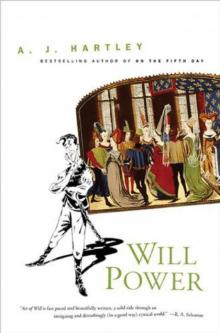 Will Power wh-2
Will Power wh-2 Hamlet, Prince of Denmark
Hamlet, Prince of Denmark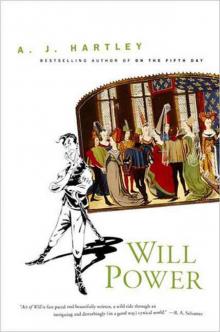 Will Power
Will Power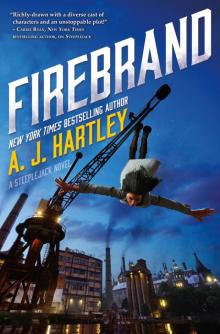 Firebrand
Firebrand A Novel
A Novel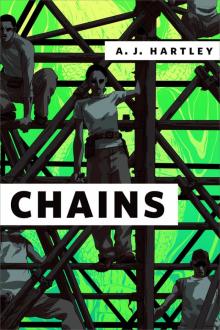 Chains
Chains Guardian
Guardian Darwen Arkwright and the School of Shadows
Darwen Arkwright and the School of Shadows Act of Will
Act of Will Darwen Arkwright and the Insidious Bleck
Darwen Arkwright and the Insidious Bleck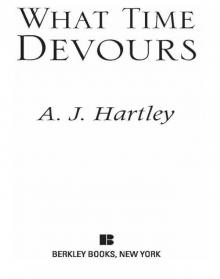 What Time Devours
What Time Devours